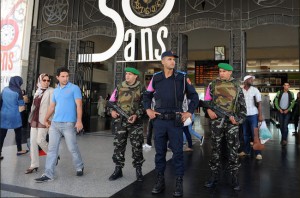By Mawassi Lahcen in Casablanca
Moroccan travellers appear stunned by the heavy police and army presence at the Rabat-Ville train station entrance on November 1, 2014.
Security forces in public arenas in Morocco “will be a strong deterrent to all criminals, offenders and terrorists”, a Casablanca man says.
In an unprecedented measure in Morocco, army and police personnel were deployed to streets and squares in the kingdom’s main cities, and outside vital sites and tourist facilities.
The heavy presence of military and other security forces came as part of the “Hadar” counter-terrorism plan announced last week.
Still, many citizens were stunned on Saturday (November 1st) morning when they saw armed forces in official uniforms outside their homes.
“When I got out of my house in the morning, I was amazed with the spectacle of three soldiers,” said Mohamed Moussaoui, a trader from Casablanca.
“They were stationed near the pharmacy beside my house, wearing bullet-proof vests and holding machine guns. Other unarmed policemen were standing not far from the sidewalk,” he continued.
“I thought at first that this had something to do with a theft of the nearby bank,” he said.
Ahmed El Qorchi, a car park attendant, said he was also surprised with the deployment of armed forces on Friday morning, but he first linked it to the Moroccan trade unions general strike, staged just one day earlier.
“I was very afraid lest demonstrations and riots should take place; they’ve been talking about the general strike for a whole week in the news,” he added.
Although the interior minister last Wednesday presented the “Hadar” strategy during a press conference in Rabat, many citizens weren’t expecting to see army and security troops at their front doors.
“We have never seen such a security alert in Morocco since the Years of Lead,” Ahmed Filali, a real estate agent, told Magharebia.
“Even following the terrorist bombings in 2003 and 2007, things didn’t go that far,” he said.
Although security was ramped up, “soldiers weren’t deployed to streets with their machine guns as they’re doing today,” he explained.
“I was initially shocked and startled because we’re not accustomed to the spectacle of weapons in this way in the public street,” Filali added. “Frankly speaking, I now feel more secure and reassured; their presence will be a strong deterrent to all criminals, offenders and terrorists.”
“Every day, we hear and see what they’re doing in Syria, Iraq and Libya,” he said. “Our country is stable and secure and we have to work hard to protect that blessing against all threats and risks.”
While presenting the “Hadar” operation to journalists last week, Interior Minister Mohamed Hassad tried to reassure citizens.
Morocco is not facing any direct, tangible threats in the foreseeable future, he said, but caution and vigilance are necessary in the face of terrorism.
“Hadar” is a pre-emptive, preventive plan and not a measure aimed at dealing with a specific threat, he explained.
Morocco recently dismantled many terrorist cells with ties to the Islamic State (ISIS). However, they were mostly small cells with just one or two members. A number of foreigners from France, Spain, Belgium and Algeria, in addition to some Moroccans who hold other nationalities, were among those detained.
Morocco fears the use of foreigners or Moroccans holding dual citizenships by ISIS as lone wolves to carry out terrorist operations against foreign and local interests in the kingdom.
The country also fears threats posed by the re-deployment of Moroccan fighters who took part in battles in Syria.
Moroccans did not forget that fighters returning from Afghanistan were behind the suicide bombings in Casablanca on May 16th, 2003, in which about 50 were killed.








